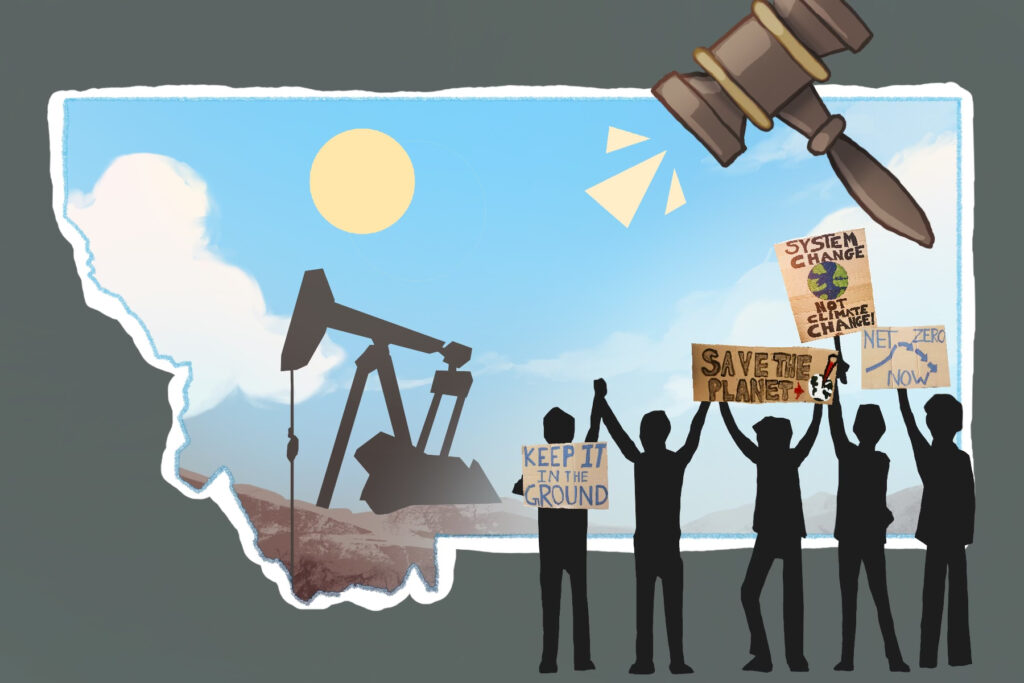For years, a group of teens has been taking the government to court for the climate — and in Montana, the young plaintiffs snatched their first win. The case, led by lawyers at Our Children’s Trust, made headlines as the first successful youth climate litigation in the world. But that’s not all— it also historically held a state government accountable for protecting our right to a safe and healthy environment. Is this case the first in a domino effect for youth climate lawsuits? For attorneys and kids at Our Children’s Trust, Held v. Montana was just the start. They’ve got pending cases in Florida, Hawaii, Utah and Virginia, and plans to expand their work to all 50 states.
There is heightened hope for the case in Hawaii in particular, where the 14 youth plaintiffs and their attorneys have a trial date for January 2024. These youth litigants hope to affirm their right to a livable climate in state after state, eventually chasing a win at the federal level in the national Juliana v. US case.

This precedent-setting case is raising hopes, but a lot stands in the way of future progress. I talked to legal experts and one of the youth plaintiffs themselves to trace the impact of this case on the lives of the plaintiffs and the landscape of future climate change litigation. What will it take to expand this win beyond Montana?
Background
Georgianna (Georgi) Fischer, a native of Bozeman, Montana, joined the case — led by non-profit law firm Our Children’s Trust — over three years ago. Fischer grew up as a competitive cross-country skier and spent much of her winters outdoors.
“I was ski training in late December which would typically be a very snowy time,” said Fischer. “I was having to jump across patches of grass.”
Seeing the place she called home change so rapidly, she knew she needed to take action. In high school, she wrote a letter to the editor of her local paper, expressing her worries about climate change. Soon after, a friend invited her to join the case.
“Being on the case really helped me feel like I was making a difference … making positive systematic change,” she added.
The ruling
In Held v. Montana, Judge Kathy Seeley ruled that greenhouse gas emissions were threatening the state’s constitutionally guaranteed right to a safe and healthy environment. The court order allows Montana policymakers to consider the climate impacts of proposed energy projects, but does not force them to cancel fossil fuel projects. Basically, the court protected young peoples’ right to a clean environment, but in a pretty narrow way.
For Fischer and other youth plaintiffs, the ruling was more than just a legal accomplishment— it validated the personal worries they voiced on the witness stand. Fischer added that the trial took “a bigger emotional toll” than she anticipated.
“It really meant that our voices are being heard as young people,” said Fischer. “It was a big relief to get such a strong ruling from the judge connecting fossil fuels to directly harming the environment.”
Why it matters
When Fischer and the other teens on the case could not vote, they turned to the courts to express their concerns.
“Climate litigation is becoming increasingly important, especially as the climate crisis gets more dire,” she added. “I think it’s a great precedent, and a great sign of hope for many people.”
Christopher Serkin, a professor at Vanderbilt Law School, explained that featuring kids as plaintiffs highlights the “intertemporal or intergenerational” impacts of climate change. In other words, it reminds the judges of whom the climate crisis will hurt the most in the future.
“It’s one of the first cases I’m aware of that involves really comprehensive judicial findings of fact, about climate science, and the impact of climate change,” Serkin added.
While this ruling amazed legal experts like Serkin, they are not so sure of how quickly this win can translate into similar successes in other states. Serkin explained that Montana’s case was based on the state having a “Green Amendment” — a line in a state’s constitution that protects its residents’ right to a safe environment. Only three U.S. states have a “Green Amendment” — Montana, New York, and Pennsylvania — with nine other states considering adding one.
According to Serkin, that Green Amendment was the necessary “constitutional hook” for the lawsuit, so it might not be possible to re-create these cases in other states that don’t have a Green Amendment.
A new legal landscape
Following the historic ruling in Held v. Montana, the doors seem wide open for future lawsuits that combine youth climate action with the power of law. Our Children’s Trust, already has pending cases in four more states and in federal courts. But, there could be even more on the horizon.
Serkin explained that one of the issues in the Montana case was called the “public trust doctrine.” This is a legal idea that allows governments to protect natural lands or waters on behalf of the public. But, it has typically only been applied to cases involving navigable waters, like rivers. So, for now, there aren’t many lawyers trying to apply this idea to climate change cases, but Serkin imagines a future in which there might be more attempts to.
He adds that lawyers could alternatively use “public nuisance” laws and target polluting companies by arguing that their carbon emissions create a bother for the public.
“The legal system is going to be intimately bound up with climate change and addressing climate change,” added Serkin.
As kids in similar cases in Hawaii and at the federal level await their day in court, Fischer shared some advice for them. Despite how nerve wracking it might be to give testimony, Fischer told future plaintiffs to “put their voices out there.”
“Speaking up is really worth it,” she said. “It’s really important to stand up for what you believe in and stand up for our futures and fight for change.”



